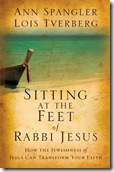This summer I read a book sent to me by one of the authors that I am happy to recommend to my readers here. Sitting at the Feet of Rabbi Jesus is subtitled “How the Jewishness of Jesus Can Transform Your Faith.” The essence of the book is to reveal aspects of Jewish life that inform how we (should) read the New Testament. 
Ann Spangler teamed up with Lois Tverberg to write an engaging study of first-century customs that would have been familiar to Jesus and his disciples, but are unknown to most readers today. The book includes chapters focusing on rabbis and disciples, education, prayer, blessings, Jewish feasts, Torah, and the kingdom of God. The appendices and glossary provide much helpful information.
Quite a bit of work has been done in the last few decades in the area of Jewish backgrounds of the New Testament, but much of it I cannot recommend. This book distinguishes itself in several ways. First, the research upon which the book is based is trustworthy. I don’t agree with every bit of analysis, but they use the best sources. Second, while the first point would lead you to expect that this is a “scholarly” work, it is, in fact, written to a popular audience and the writing style is superb. Third, the book is not an academic exercise, but the writers are very interested that their discoveries impact the reader’s faith and daily life. Altogether, these three realities combine to make an excellent book.
There were a few things I would change, and I note these more as testimony that I carefully read the whole book than to affect my positive endorsement. I haven’t read too many books that were co-authored, but these writers often told personal stories and the use of the first-person singular (“I”) sometimes felt awkward. Another issue was the way that a chapter would end so that it led to the next chapter. Perhaps it was the intervening page-long study/thought questions that made the transitions not work as well as I think they were intended. Theologically, I am more and more uncomfortable with the way that the definition of the “kingdom” is derived from later church history than from Jesus’ Bible, but the authors can certainly claim to belong to a larger subset of modern Christianity in this regard than I do.
Brief quotations cannot communicate the argument of a book, but as they may give a sense for the tone, I include a few below:
“Instead of making our hearts burn, sometimes Scripture makes us scratch our head in confusion” (12).
“One day, when the presiding rabbi was having trouble generating group discussion, he fired off question after question, finally tossing out a provocative comment to stir things up. But still the group was silent. Exasperated, the rabbi exclaimed, ‘Come on people! Somebody disagree with me! How can we learn anything if no one will disagree?” (29)
“When Jesus called himself a ‘shepherd’ in John 10, he was hinting at his identity as the messianic king, the future ruler of God’s kingdom” (46).
“While the Gospels record many instances of Jesus instantly healing people’s illnesses, we know of not even one instance in which he simply waved his hand to immediately fix an ugly habit for one of his disciples. Instead, he simply kept teaching and correcting them, giving them time to grow” (56).
Of all the popular “Jewish background of Jesus” books that I have read, this one was the best.